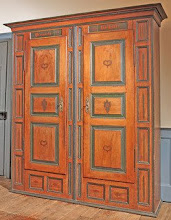Last month, Clayton Pennington's editorial in Maine Antique Digest urged auction houses to help protect consignors through the use of escrow accounts and the requiring of internet bidders to leave credit card numbers in order to leave bids. Both are good ideas.
The use of escrow accounts for consignors is proscribed under Ohio auction law. All payments from auction buyers in Ohio must be deposited by the auctioneer into an escrow account and that account cannot be used for anything else by the auctioneer. In fact, co-mingling of funds (mixing the auctioneer's money with auction proceeds) is one of the deadly sins an Ohio auctioneer can commit that will often get his or her license immediately suspended or revoked. This is good policy that helps protect consignors, and, frankly, all states should require the use of escrow accounts.
Requiring a credit card on internet bids, or regular absentee bids for that matter, is also wise, but doesn't necessarily solve the problem. Andrew had an experience when he worked for an auction firm in Cincinnati that illustrates this. A remote buyer bids on, and buys, a porcelain figure in an auction. Thirty days pass, two invoices are sent, and no payment has been received, so the buyer's credit card is charged for the purchase price and shipping and the item is sent. Within a week, notice was received from the credit card company that the buyer is claiming fraud (the figure was allegedly damaged and that damaged was not disclosed before bidding) and the moneys have been refunded to them. So...now the buyer has the item and the money.
You see, organizations like banks, the post office, UPS, etc. etc. simply do not understand antiques or how the antiques business operates (have you ever tried to explain to FedEx that they could pay to have the item fixed, but it's still worth less because now it's repaired???). In this case, the figure had a factory flaw that was described in the condition report, but the person at the bank didn't know the difference between a factory flaw, a crack, or a chip, so they immediately believed the buyer and refunded their money, and left the auction house hanging. Andrew did end up getting the item back, but after two months of arguing with the bank, appealing their decision, and hounding the buyer.
This is the flaw in the use of credit cards as "security" against deadbeat bidders: it's simply too easy for someone who is determined not to pay to actually just not pay. Use a bad credit card number (does anyone actually confirm card numbers prior to executing bids? And we'll talk later about the expectations of bidders and how frustrating extending deadlines would be if it became necessary to allow time prior to auction for a verification process....), lying about damage or some other issue to get a payment refunded, or had the auction house charged the buyer the purchase price but not shipped it, appealing the charge on the basis of non-receipt. Auction houses are simply at the mercy of the banks who are ignorant of how this process is suppose to work.
What might be a better way to protect consignors, and auction houses, against deadbeat bidders is a national database of non-paying bidders. Let an objective organization, such as the National Auctioneers Association, manage it. If an auctioneer encounters a deadbeat bidder, let him or her submit proof to the organization and that bidder's info gets entered into the database. Auction houses could run checks against the database for bidders new to them. If Joe Deadbeat can no longer register to bid at auctions because he's in the database, then that'll be fewer consignors who get disappointed by not getting paid for their item(s).
Bidders have all sorts of protection against crooked auctioneers (law enforcement, attorney general, auctioneer licensing organization, and, of course, banks), but auctioneers and their consignors have little protection against crooked bidders. And the last thing an auctioneer wants to do, even more than not getting paid, is disappoint a consignor.
Tuesday, July 21, 2009
Subscribe to:
Post Comments (Atom)


3 comments:
Yeah, tough biz no doubt. This credit/debit card scam is the reason i think many auction houses do not accept them, to much liability not to mention the points.
Agreed, and I wish we could do away with credit cards at auctions. However, accepting credit cards gets you paid quicker, and that's important if you pay your consignors in 28 days. But you're right...it's not cheap...thousands per year.
Hi Hollie & Andrew,
I have spent some time reading your column in the Antique Digest for some time now. Good job in promoting the concept of change in the industry. I have worked in the industry for over a decade and hold the same opinion. Check out my blog... www.adiscourseontheartsandsciences.net/blog. Use Safari as your browser since internet explorer seems to be having a temporary issue with it... We have many of the same thoughts regarding the need for the industry to redefine itself. Good to know you are out there too!
Post a Comment